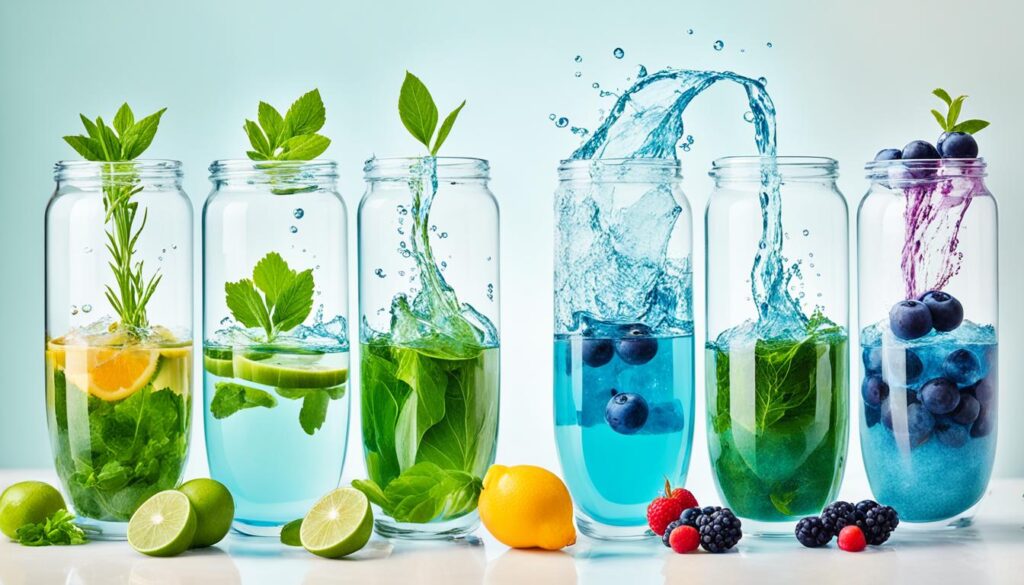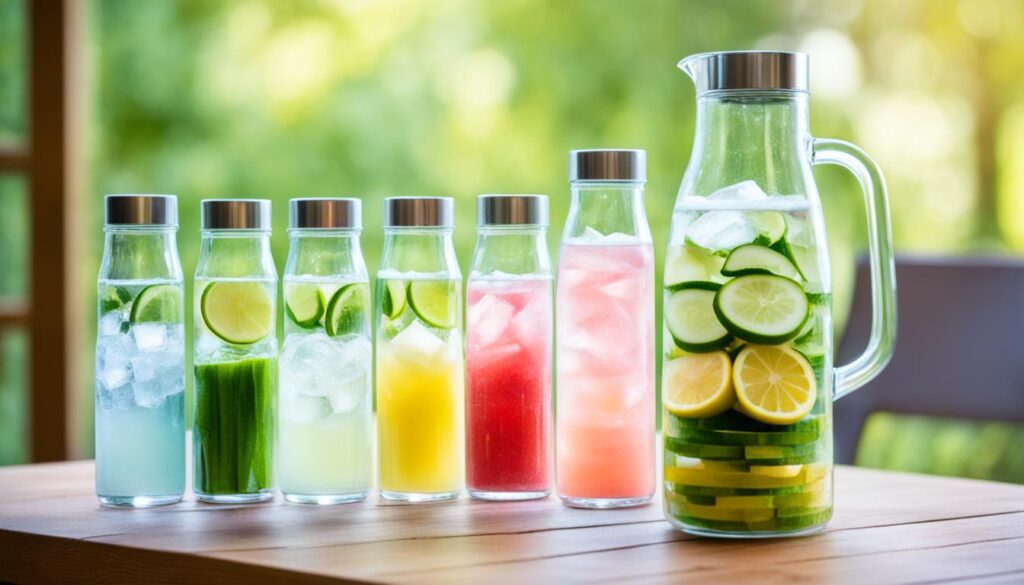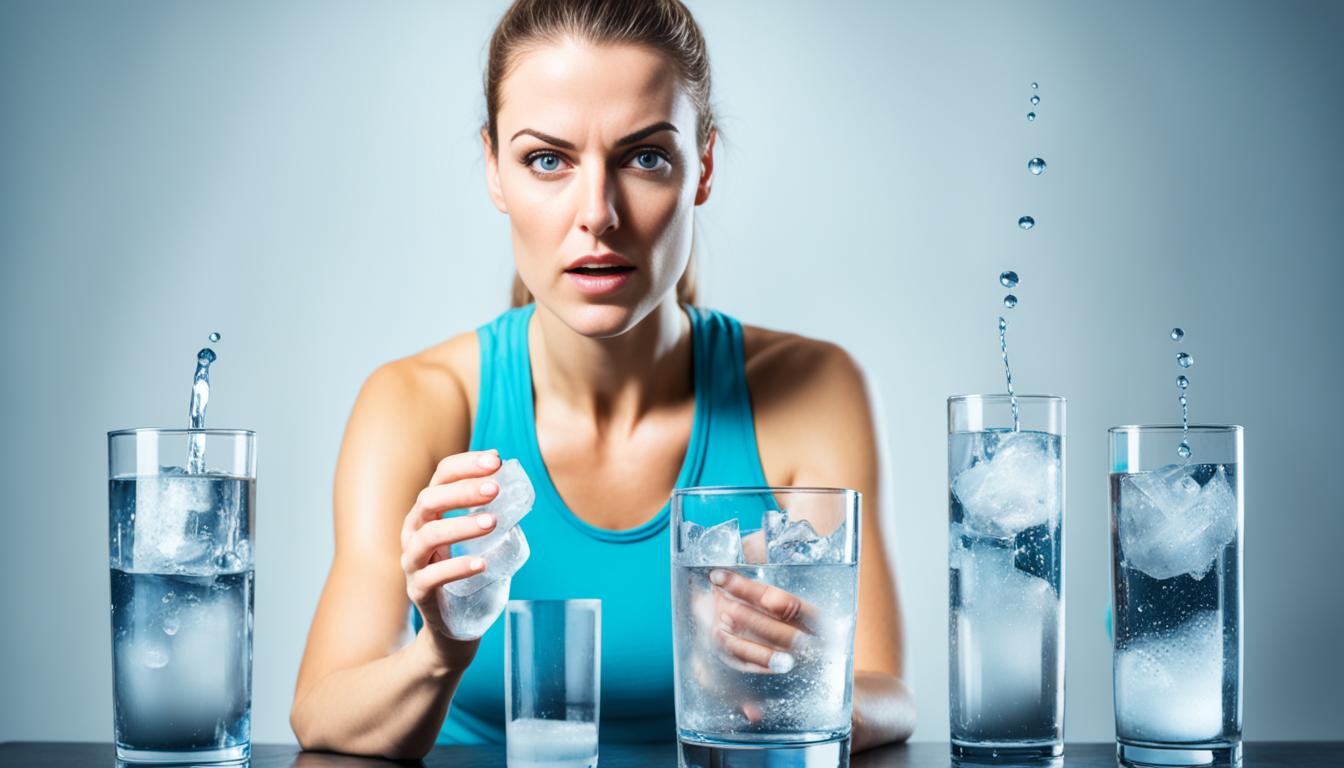Do you want to start a challenge and clean your body? The 7-day water diet is perfect. Also called a water fast, it helps kickstart a healthier life. This diet is a low-calorie way to burn fat and clean your body. It also keeps you well-hydrated with a simple hydration plan.
Studies found that water fasting can really help you lose weight. People who fasted for five days dropped 4% to 6% of their weight. For those fasting up to 10 days, the loss was even bigger, 2% to 10%. The real wow was seen in people fasting 15 to 20 days – they lost 7% to 10% of their weight.
But, does this diet work for long-term weight loss? One study found that after a five-day fast, people gained all the weight back in three months. This tells us that lasting weight loss needs a healthy diet.
Some research is exciting. A study with 12 people on a seven-day fast showed a 12.5-pound weight drop in three days. This weight loss was from both fat and muscle. But, the good news is, they didn’t gain the fat back right away. This shows that with the right care, you might keep off the fat you lose.
After the fast, the muscle that was lost came back in three days. But, the fat lost during the fast stayed off. More studies are needed. They will help us see if this diet can help with long-lasting fat loss and keep us healthy.
Key Takeaways
- A 7-day water diet, or water fast, can lead to significant short-term weight loss.
- Participants in studies lost between 4% and 10% of their body weight, depending on the duration of the fast.
- In a groundbreaking study, volunteers lost an average of 12.5 pounds in the first 72 hours of a seven-day water fast.
- Lost lean mass during the fast was typically restored post-fast, while fat mass remained reduced.
- Long-term weight loss maintenance after a water fast remains unclear, highlighting the importance of adopting sustainable, healthy eating habits.
What is a Water Fast and How Does it Work?
Let’s talk about water fasting. It’s when you only drink water for 24 to 72 hours. It’s a popular method for losing weight fast and cleansing your body. When you fast, your body goes into ketosis. This means it starts using up fat stores for energy because it has no new calories to burn.
The Science Behind Water Fasting
So, what’s the science behind this process? It’s all about autophagy which is the body’s way of cleaning up at the cellular level. During fasting, your body recycles old proteins and components. This cleaning leads to benefits like less inflammation, better insulin function, sharper brain, and a longer life.
- Reduced inflammation
- Improved insulin sensitivity
- Enhanced brain function
- Increased longevity
Studies in animals point out that autophagy might also fight cancer and brain diseases like Alzheimer’s. Even though more human studies are needed, the early signs are good.
Benefits of Short-Term Water Fasting
Aside from cleaning up your body, short water fasts can do a lot more. For example, fasting for 17 days can greatly lower high blood pressure. It also makes your body more sensitive to insulin and leptin, which prevents diabetes and obesity.
| Potential Benefit | Supporting Evidence |
|---|---|
| Reduced heart disease risk | Research in 2013 found that a 24-hour fast lowered heart disease risk by dropping blood triglycerides. |
| Improved blood pressure | In the same study, fasting for 17 days reduced high blood pressure. |
| Enhanced insulin and leptin sensitivity | It also boosts how well your body responds to insulin and leptin, helping to fend off type 2 diabetes and obesity. |
The health benefits of water fasting are amazing. But, you should always check with a doctor before trying it. Fasting can be tough on your body and mind, especially if you have diabetes or an eating disorder. It’s also key to drink lots of water when you fast, since you usually get about a quarter of your water from food.
Preparing Your Body for a 7-Day Water Diet
Before starting a 7-day water fast, getting your body ready is critical. This helps you switch to the water fast more smoothly. To prepare, start by eating smaller meals and trying out intermittent fasting. This will get your body used to eating less and help avoid negative effects.

Pre-Fast Phase: Reducing Portion Sizes and Fasting Periods
Eat smaller but healthy meals during the pre-fast phase. This approach lets your body adjust to less food without shock. Also, try intermittent fasting like the 16/8 schedule. This means fasting for 16 hours and eating in an 8-hour window. It can balance your insulin and make it easier to go without food for long.
Here’s how your meals might be planned:
| Meal | Food Items | Portion Size |
|---|---|---|
| Breakfast | Oatmeal with berries and nuts | 1/2 cup oatmeal, 1/4 cup berries, 1 tbsp nuts |
| Lunch | Grilled chicken salad with mixed greens | 3 oz chicken, 2 cups mixed greens, 1 tbsp dressing |
| Dinner | Baked salmon with roasted vegetables | 4 oz salmon, 1 cup roasted vegetables |
Essential Supplies and Considerations
Ensure you have some things before you start your water fast:
- Plenty of filtered or mineralized water (aim for 2-3 liters per day)
- Electrolyte supplements for balance
- Herbal teas to add flavor and extra hydration
- A journal to note how you’re doing and your thoughts during the fast
Always check with a doctor before you water fast, especially if you have health issues. Pregnant women, kids, those with eating disorders, and people over 75 must only fast with medical supervision. This is to stay safe.
By getting yourself and your mind ready before the fast, you can do better and enjoy the benefits. Always listen to your body and take care of yourself during the fast.
Embarking on Your 7-Day Water Diet for a Week
After preparing for the water fast, you’re ready to start. For the next seven days, you’ll drink only water and avoid all foods and drinks. Following a plan each day can make it easier to stay focused and deal with any challenges.

Daily Routine and Water Consumption
You should aim to drink 2-3 liters of water each day. Always listen to your body and drink more water if you’re thirsty. Setting reminders or keeping a water bottle handy can help you reach your water goals.
Rest is crucial during the fast. Try to get at least 8 hours of sleep each night. It’s also good to take time to relax and meditate. Light activities like walking or yoga can reduce stress and improve blood flow.
Potential Side Effects and When to Break the Fast
Fasting for a week can bring health benefits. But, there are some side effects:
- Headaches
- Dizziness
- Fatigue
- Insomnia
- Nausea
- Muscle aches
If side effects are severe, stop the fast and get medical help if needed. Signs to end the fast include:
| Symptom | Description |
|---|---|
| Extreme fatigue | Feeling exhausted, unable to do daily tasks |
| Dizziness or lightheadedness | Feeling like you might faint, especially when standing |
| Rapid heartbeat | Your heart races or pounds, even when not active |
| Confusion or disorientation | Having trouble thinking or focusing |
If you have these symptoms, end your fast with light foods. If they don’t go away or get worse, see a doctor.
Feeling weak or dizzy may happen. Avoid driving or using heavy machines to prevent accidents.
Undertaking a 7-day water fast is serious and needs good preparation. Stay hydrated, get enough rest, and if something feels wrong, always listen to your body. This makes for a safer and more successful fast.
Breaking Your Fast: The Post-Fast Phase
After a water fast, it’s best not to jump into a big meal. Doing so might cause issues. It can even lead to refeeding syndrome for those who have been malnourished. Start with a smoothie or small meals. Then, work your way up to bigger meals as you’re ready.
Longer fasts might have put your digestive system on pause. Because of this, you should ease back into eating. This easing-in period could last up to three days after your fast ends. For a 5-day fast, eat 30-40% of your normal calories on day one, and 50% on day two. If you fasted for 10 days, add food back slowly over a 5-day period.
When you start eating again, choose foods that are gentle on your stomach. Good options include:
- Broth and soups
- Smoothies
- Fermented drinks like kefir and kombucha
- Well-cooked vegetables
- Green juices
- Fermented foods like sauerkraut and kimchi
- Protein shakes with bone broth collagen or vegan protein
These foods are loaded with nutrients. They also contain enzymes, probiotics, and prebiotic fibers. This helps your gut and microbiome recover. Go slowly and listen to your body to avoid upsetting your stomach.
People who fast more than 10 days need a few recovery days. This helps ensure they get back to eating normally without issues.
| Length of Water Fast | Post-Fast Phase Duration | Calorie Reintroduction Schedule |
|---|---|---|
| 5 days | 1-2 days | Day 1: 30-40% of normal calorie load Day 2: 50% of normal calorie load |
| 10 days | 5 days | Gentle food reintroduction over 5 days |
| More than 10 days | 1 recovery day for every 2-3 fasting days | Gradual food reintroduction based on fasting duration |
Easing back into food slowly and choosing foods that are easy to digest is key. This approach cuts down on the risk of refeeding syndrome. It also aids your body’s healing after the fast.
Risks and Precautions of Water Fasting
Water fasting has its benefits like helping your body get rid of old cells. It can even lower the chances of sickness and help you lose weight. But, it’s important to know there are risks too. Not everyone should try it because it can lead to health problems.
Who Should Avoid Water Fasting
Some people shouldn’t try water fasting on their own. This includes kids, teens, and adults over 75. Also, pregnant or nursing women, those with eating disorders, and individuals suffering from illnesses like gout and diabetes. Always talk to a doctor before starting a fast to make sure it’s a safe choice for you.
Potential Health Complications
Water fasting can cause serious health risks like not drinking enough water. When you don’t eat, around 20-30% of your water comes from food. This means you might not get enough water, leading to dizziness, nausea, or constipation. If you feel really bad, you should stop the fast right away.
Fasting on water for a long time can also make you lose muscle. Your body uses protein from muscles for energy when you’re not eating. Plus, you might get a sudden drop in blood pressure when you stand up. This can make you feel dizzy and even faint. Always be careful, and end the fast if things start to feel wrong.




